Self-Reflective Report: Managing in International Business (7BSP1208)
VerifiedAdded on 2023/01/04
|11
|2307
|28
Report
AI Summary
This report delves into the critical aspects of managing international business, emphasizing the role of managers in fostering organizational effectiveness. It explores the importance of performance management systems, such as balanced scorecards, and the significance of leadership skills in a global context. The assignment examines the application of Maslow's hierarchy of needs and Hofstede's cultural dimensions in motivating and managing teams across diverse cultural landscapes, specifically focusing on India, Sri Lanka, and the UK. It analyzes cultural differences and their impact on leadership styles, communication, and team dynamics. The report highlights the challenges of cross-cultural management, including the identification of appropriate motivational systems and the resolution of conflicts arising from cultural disparities. It also addresses the need for cultural training and the importance of respecting diverse perspectives to enhance diversity and organizational effectiveness. Finally, it emphasizes the role of policies and incentives in supporting managers and fostering a conducive work environment.
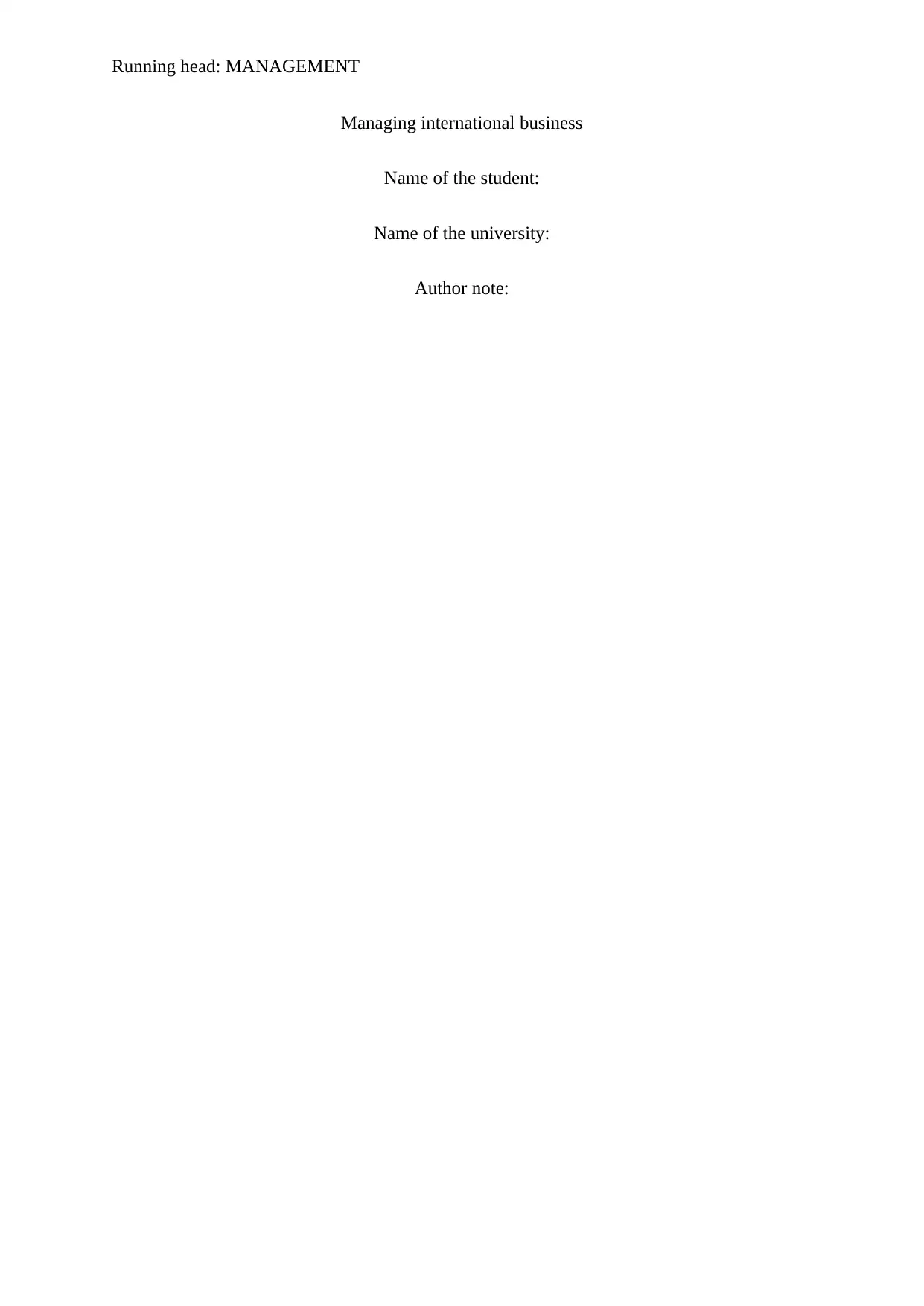
Running head: MANAGEMENT
Managing international business
Name of the student:
Name of the university:
Author note:
Managing international business
Name of the student:
Name of the university:
Author note:
Paraphrase This Document
Need a fresh take? Get an instant paraphrase of this document with our AI Paraphraser
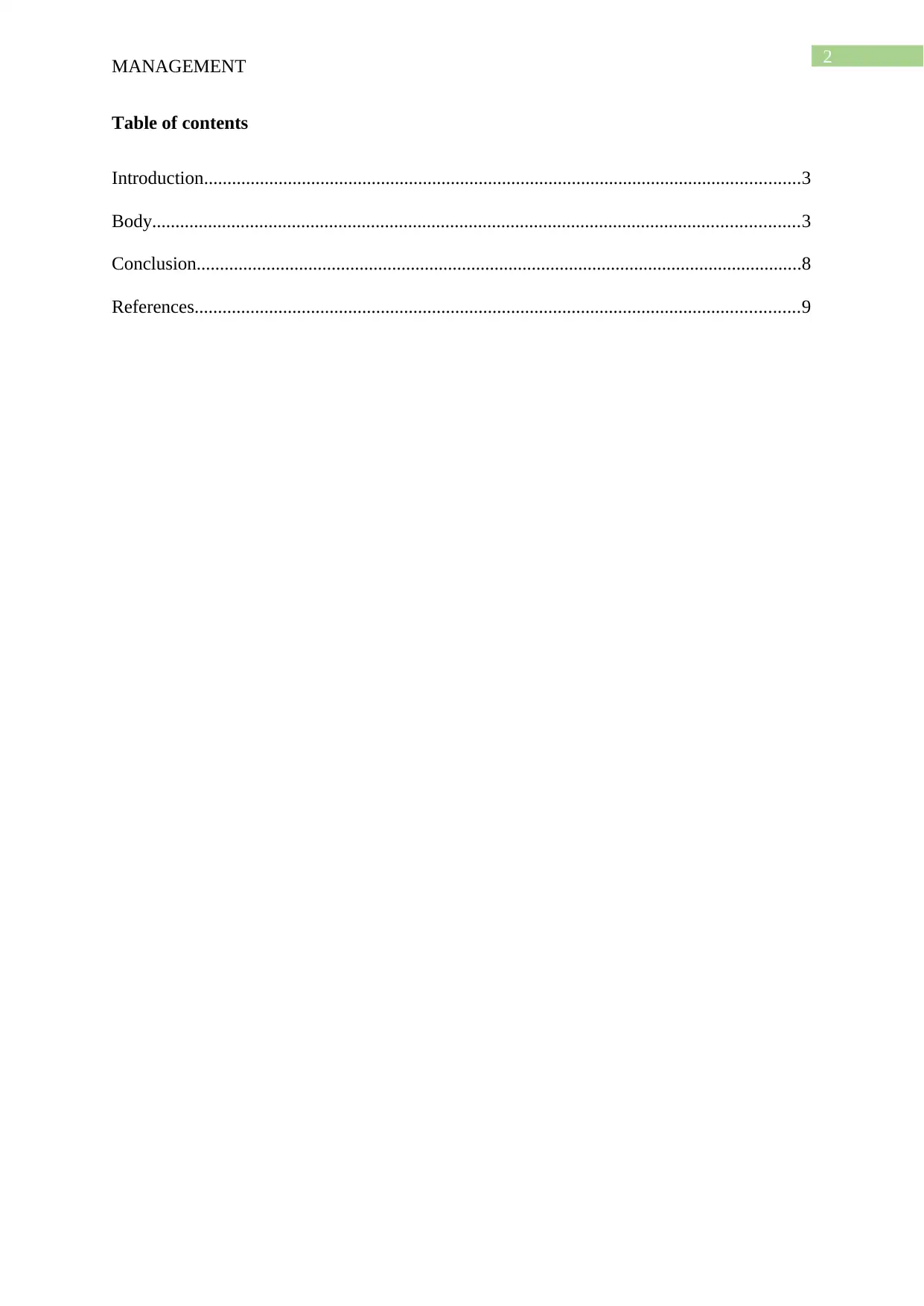
2
MANAGEMENT
Table of contents
Introduction................................................................................................................................3
Body...........................................................................................................................................3
Conclusion..................................................................................................................................8
References..................................................................................................................................9
MANAGEMENT
Table of contents
Introduction................................................................................................................................3
Body...........................................................................................................................................3
Conclusion..................................................................................................................................8
References..................................................................................................................................9
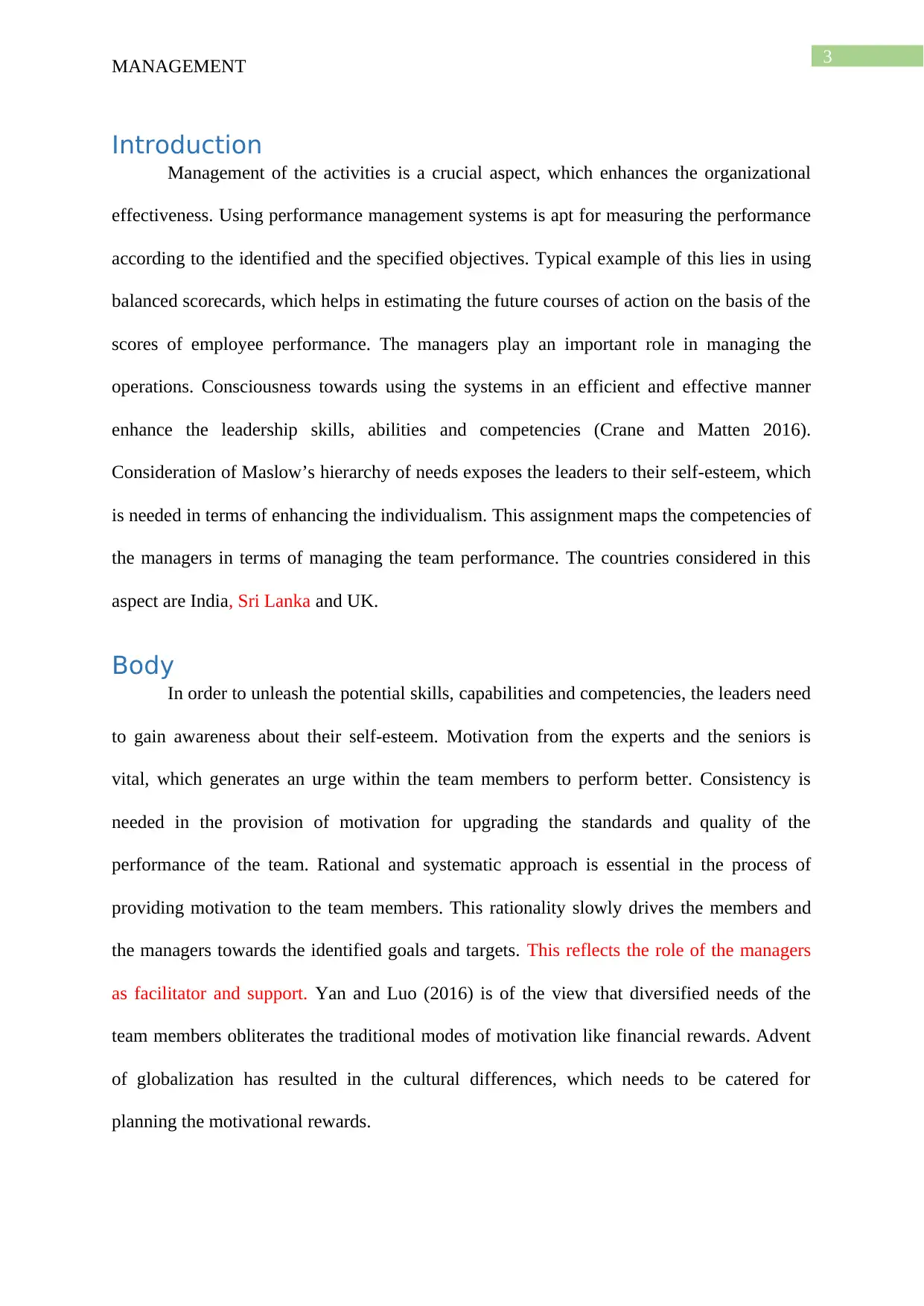
3
MANAGEMENT
Introduction
Management of the activities is a crucial aspect, which enhances the organizational
effectiveness. Using performance management systems is apt for measuring the performance
according to the identified and the specified objectives. Typical example of this lies in using
balanced scorecards, which helps in estimating the future courses of action on the basis of the
scores of employee performance. The managers play an important role in managing the
operations. Consciousness towards using the systems in an efficient and effective manner
enhance the leadership skills, abilities and competencies (Crane and Matten 2016).
Consideration of Maslow’s hierarchy of needs exposes the leaders to their self-esteem, which
is needed in terms of enhancing the individualism. This assignment maps the competencies of
the managers in terms of managing the team performance. The countries considered in this
aspect are India, Sri Lanka and UK.
Body
In order to unleash the potential skills, capabilities and competencies, the leaders need
to gain awareness about their self-esteem. Motivation from the experts and the seniors is
vital, which generates an urge within the team members to perform better. Consistency is
needed in the provision of motivation for upgrading the standards and quality of the
performance of the team. Rational and systematic approach is essential in the process of
providing motivation to the team members. This rationality slowly drives the members and
the managers towards the identified goals and targets. This reflects the role of the managers
as facilitator and support. Yan and Luo (2016) is of the view that diversified needs of the
team members obliterates the traditional modes of motivation like financial rewards. Advent
of globalization has resulted in the cultural differences, which needs to be catered for
planning the motivational rewards.
MANAGEMENT
Introduction
Management of the activities is a crucial aspect, which enhances the organizational
effectiveness. Using performance management systems is apt for measuring the performance
according to the identified and the specified objectives. Typical example of this lies in using
balanced scorecards, which helps in estimating the future courses of action on the basis of the
scores of employee performance. The managers play an important role in managing the
operations. Consciousness towards using the systems in an efficient and effective manner
enhance the leadership skills, abilities and competencies (Crane and Matten 2016).
Consideration of Maslow’s hierarchy of needs exposes the leaders to their self-esteem, which
is needed in terms of enhancing the individualism. This assignment maps the competencies of
the managers in terms of managing the team performance. The countries considered in this
aspect are India, Sri Lanka and UK.
Body
In order to unleash the potential skills, capabilities and competencies, the leaders need
to gain awareness about their self-esteem. Motivation from the experts and the seniors is
vital, which generates an urge within the team members to perform better. Consistency is
needed in the provision of motivation for upgrading the standards and quality of the
performance of the team. Rational and systematic approach is essential in the process of
providing motivation to the team members. This rationality slowly drives the members and
the managers towards the identified goals and targets. This reflects the role of the managers
as facilitator and support. Yan and Luo (2016) is of the view that diversified needs of the
team members obliterates the traditional modes of motivation like financial rewards. Advent
of globalization has resulted in the cultural differences, which needs to be catered for
planning the motivational rewards.
⊘ This is a preview!⊘
Do you want full access?
Subscribe today to unlock all pages.

Trusted by 1+ million students worldwide
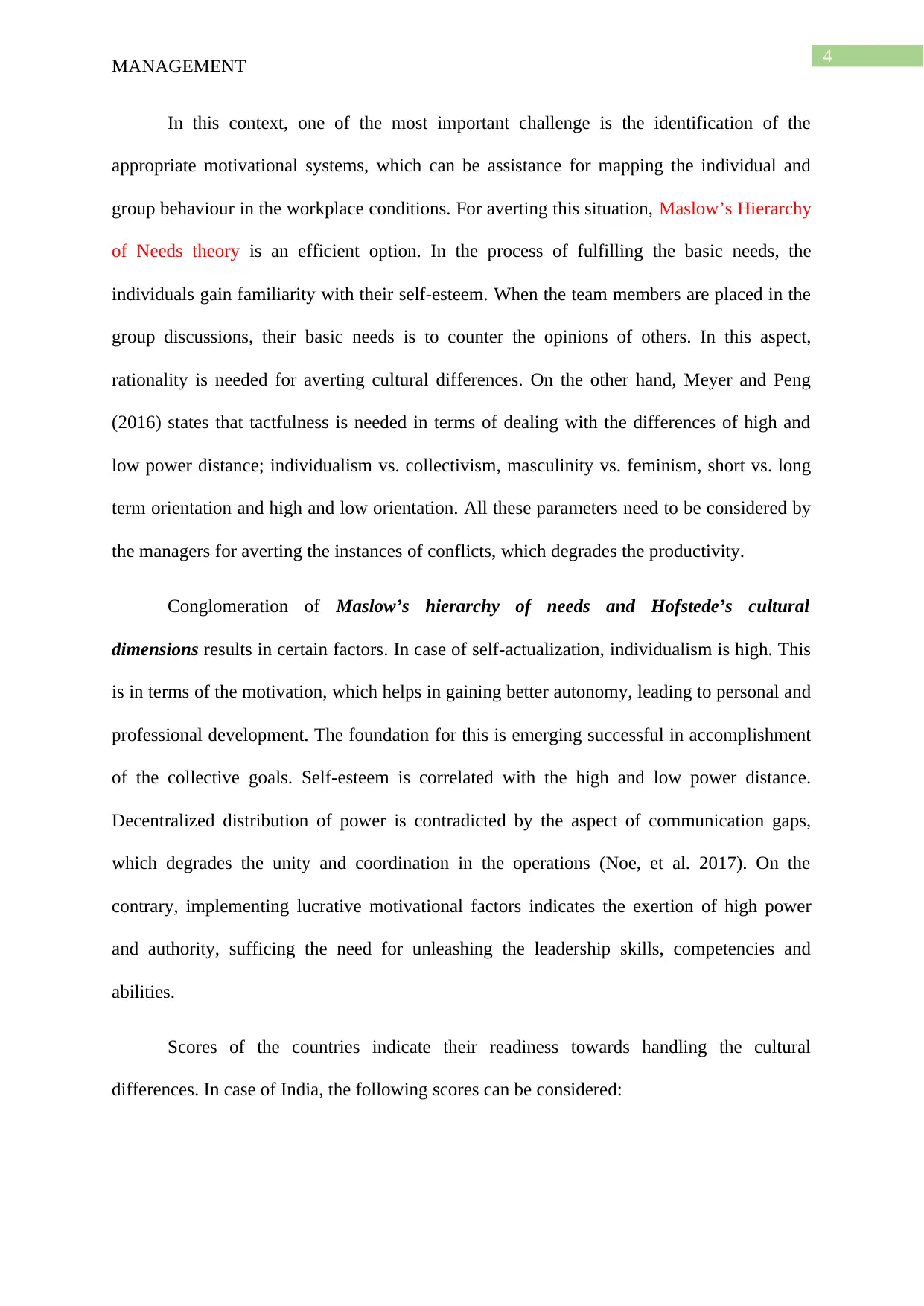
4
MANAGEMENT
In this context, one of the most important challenge is the identification of the
appropriate motivational systems, which can be assistance for mapping the individual and
group behaviour in the workplace conditions. For averting this situation, Maslow’s Hierarchy
of Needs theory is an efficient option. In the process of fulfilling the basic needs, the
individuals gain familiarity with their self-esteem. When the team members are placed in the
group discussions, their basic needs is to counter the opinions of others. In this aspect,
rationality is needed for averting cultural differences. On the other hand, Meyer and Peng
(2016) states that tactfulness is needed in terms of dealing with the differences of high and
low power distance; individualism vs. collectivism, masculinity vs. feminism, short vs. long
term orientation and high and low orientation. All these parameters need to be considered by
the managers for averting the instances of conflicts, which degrades the productivity.
Conglomeration of Maslow’s hierarchy of needs and Hofstede’s cultural
dimensions results in certain factors. In case of self-actualization, individualism is high. This
is in terms of the motivation, which helps in gaining better autonomy, leading to personal and
professional development. The foundation for this is emerging successful in accomplishment
of the collective goals. Self-esteem is correlated with the high and low power distance.
Decentralized distribution of power is contradicted by the aspect of communication gaps,
which degrades the unity and coordination in the operations (Noe, et al. 2017). On the
contrary, implementing lucrative motivational factors indicates the exertion of high power
and authority, sufficing the need for unleashing the leadership skills, competencies and
abilities.
Scores of the countries indicate their readiness towards handling the cultural
differences. In case of India, the following scores can be considered:
MANAGEMENT
In this context, one of the most important challenge is the identification of the
appropriate motivational systems, which can be assistance for mapping the individual and
group behaviour in the workplace conditions. For averting this situation, Maslow’s Hierarchy
of Needs theory is an efficient option. In the process of fulfilling the basic needs, the
individuals gain familiarity with their self-esteem. When the team members are placed in the
group discussions, their basic needs is to counter the opinions of others. In this aspect,
rationality is needed for averting cultural differences. On the other hand, Meyer and Peng
(2016) states that tactfulness is needed in terms of dealing with the differences of high and
low power distance; individualism vs. collectivism, masculinity vs. feminism, short vs. long
term orientation and high and low orientation. All these parameters need to be considered by
the managers for averting the instances of conflicts, which degrades the productivity.
Conglomeration of Maslow’s hierarchy of needs and Hofstede’s cultural
dimensions results in certain factors. In case of self-actualization, individualism is high. This
is in terms of the motivation, which helps in gaining better autonomy, leading to personal and
professional development. The foundation for this is emerging successful in accomplishment
of the collective goals. Self-esteem is correlated with the high and low power distance.
Decentralized distribution of power is contradicted by the aspect of communication gaps,
which degrades the unity and coordination in the operations (Noe, et al. 2017). On the
contrary, implementing lucrative motivational factors indicates the exertion of high power
and authority, sufficing the need for unleashing the leadership skills, competencies and
abilities.
Scores of the countries indicate their readiness towards handling the cultural
differences. In case of India, the following scores can be considered:
Paraphrase This Document
Need a fresh take? Get an instant paraphrase of this document with our AI Paraphraser
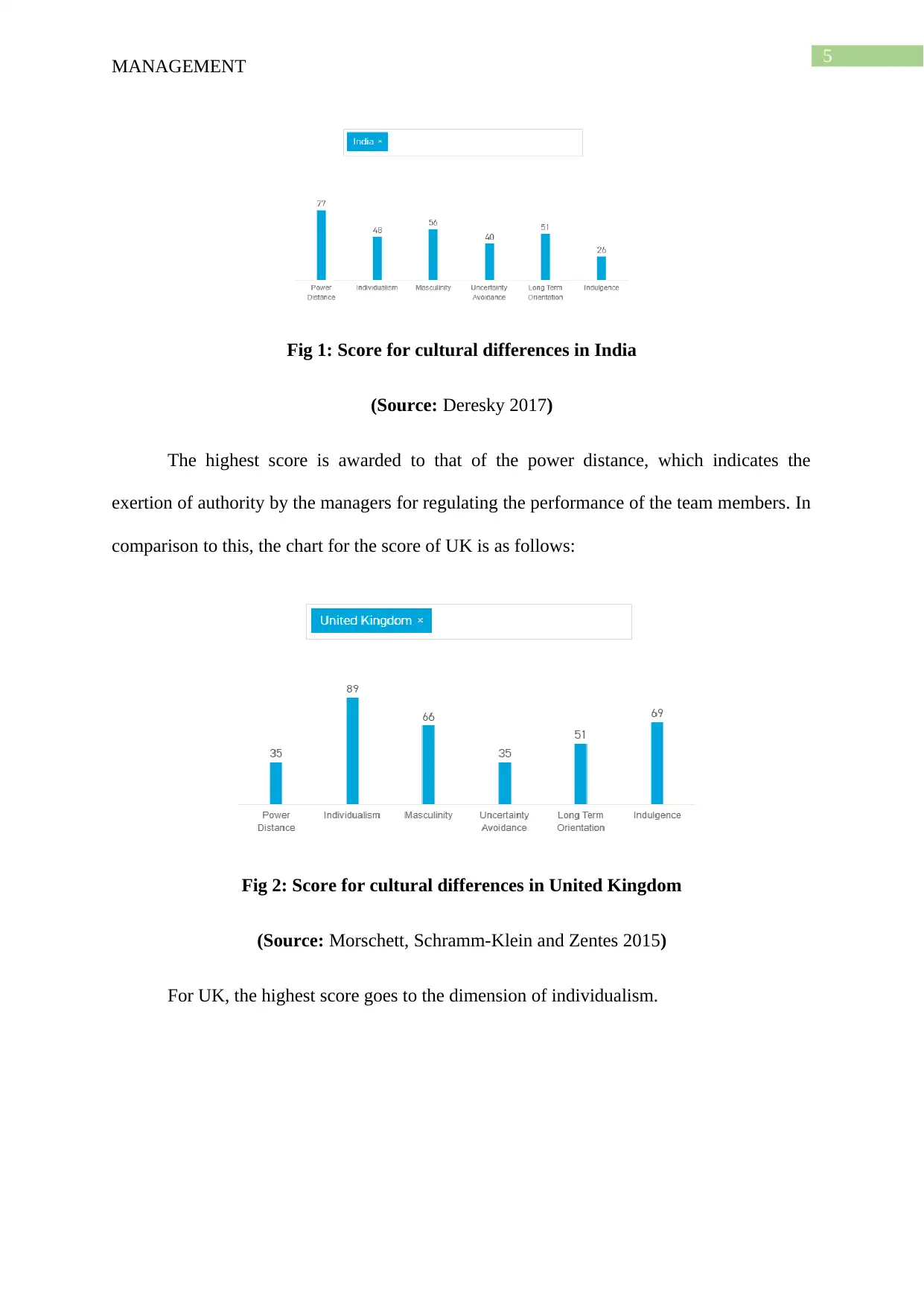
5
MANAGEMENT
Fig 1: Score for cultural differences in India
(Source: Deresky 2017)
The highest score is awarded to that of the power distance, which indicates the
exertion of authority by the managers for regulating the performance of the team members. In
comparison to this, the chart for the score of UK is as follows:
Fig 2: Score for cultural differences in United Kingdom
(Source: Morschett, Schramm-Klein and Zentes 2015)
For UK, the highest score goes to the dimension of individualism.
MANAGEMENT
Fig 1: Score for cultural differences in India
(Source: Deresky 2017)
The highest score is awarded to that of the power distance, which indicates the
exertion of authority by the managers for regulating the performance of the team members. In
comparison to this, the chart for the score of UK is as follows:
Fig 2: Score for cultural differences in United Kingdom
(Source: Morschett, Schramm-Klein and Zentes 2015)
For UK, the highest score goes to the dimension of individualism.
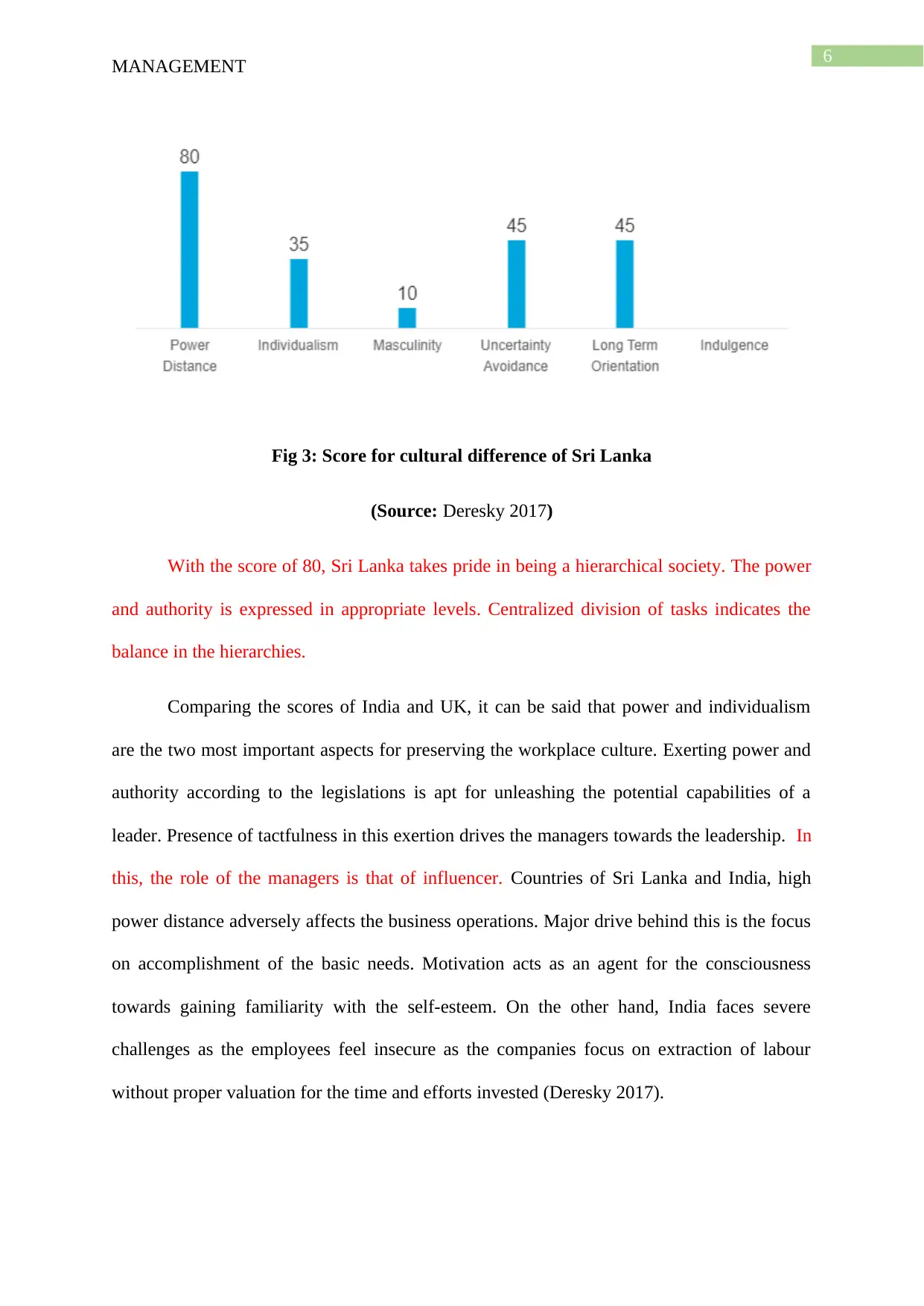
6
MANAGEMENT
Fig 3: Score for cultural difference of Sri Lanka
(Source: Deresky 2017)
With the score of 80, Sri Lanka takes pride in being a hierarchical society. The power
and authority is expressed in appropriate levels. Centralized division of tasks indicates the
balance in the hierarchies.
Comparing the scores of India and UK, it can be said that power and individualism
are the two most important aspects for preserving the workplace culture. Exerting power and
authority according to the legislations is apt for unleashing the potential capabilities of a
leader. Presence of tactfulness in this exertion drives the managers towards the leadership. In
this, the role of the managers is that of influencer. Countries of Sri Lanka and India, high
power distance adversely affects the business operations. Major drive behind this is the focus
on accomplishment of the basic needs. Motivation acts as an agent for the consciousness
towards gaining familiarity with the self-esteem. On the other hand, India faces severe
challenges as the employees feel insecure as the companies focus on extraction of labour
without proper valuation for the time and efforts invested (Deresky 2017).
MANAGEMENT
Fig 3: Score for cultural difference of Sri Lanka
(Source: Deresky 2017)
With the score of 80, Sri Lanka takes pride in being a hierarchical society. The power
and authority is expressed in appropriate levels. Centralized division of tasks indicates the
balance in the hierarchies.
Comparing the scores of India and UK, it can be said that power and individualism
are the two most important aspects for preserving the workplace culture. Exerting power and
authority according to the legislations is apt for unleashing the potential capabilities of a
leader. Presence of tactfulness in this exertion drives the managers towards the leadership. In
this, the role of the managers is that of influencer. Countries of Sri Lanka and India, high
power distance adversely affects the business operations. Major drive behind this is the focus
on accomplishment of the basic needs. Motivation acts as an agent for the consciousness
towards gaining familiarity with the self-esteem. On the other hand, India faces severe
challenges as the employees feel insecure as the companies focus on extraction of labour
without proper valuation for the time and efforts invested (Deresky 2017).
⊘ This is a preview!⊘
Do you want full access?
Subscribe today to unlock all pages.

Trusted by 1+ million students worldwide
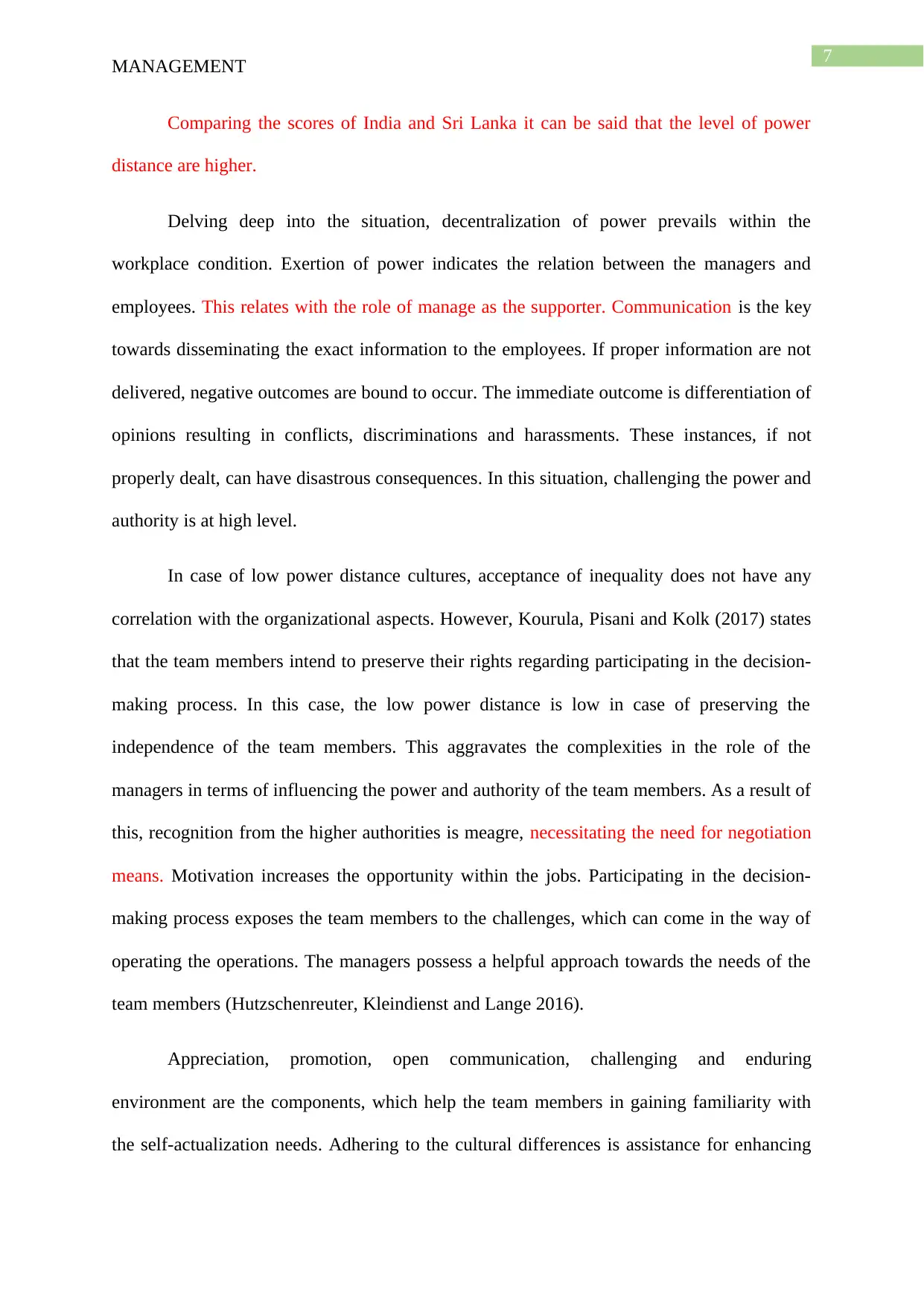
7
MANAGEMENT
Comparing the scores of India and Sri Lanka it can be said that the level of power
distance are higher.
Delving deep into the situation, decentralization of power prevails within the
workplace condition. Exertion of power indicates the relation between the managers and
employees. This relates with the role of manage as the supporter. Communication is the key
towards disseminating the exact information to the employees. If proper information are not
delivered, negative outcomes are bound to occur. The immediate outcome is differentiation of
opinions resulting in conflicts, discriminations and harassments. These instances, if not
properly dealt, can have disastrous consequences. In this situation, challenging the power and
authority is at high level.
In case of low power distance cultures, acceptance of inequality does not have any
correlation with the organizational aspects. However, Kourula, Pisani and Kolk (2017) states
that the team members intend to preserve their rights regarding participating in the decision-
making process. In this case, the low power distance is low in case of preserving the
independence of the team members. This aggravates the complexities in the role of the
managers in terms of influencing the power and authority of the team members. As a result of
this, recognition from the higher authorities is meagre, necessitating the need for negotiation
means. Motivation increases the opportunity within the jobs. Participating in the decision-
making process exposes the team members to the challenges, which can come in the way of
operating the operations. The managers possess a helpful approach towards the needs of the
team members (Hutzschenreuter, Kleindienst and Lange 2016).
Appreciation, promotion, open communication, challenging and enduring
environment are the components, which help the team members in gaining familiarity with
the self-actualization needs. Adhering to the cultural differences is assistance for enhancing
MANAGEMENT
Comparing the scores of India and Sri Lanka it can be said that the level of power
distance are higher.
Delving deep into the situation, decentralization of power prevails within the
workplace condition. Exertion of power indicates the relation between the managers and
employees. This relates with the role of manage as the supporter. Communication is the key
towards disseminating the exact information to the employees. If proper information are not
delivered, negative outcomes are bound to occur. The immediate outcome is differentiation of
opinions resulting in conflicts, discriminations and harassments. These instances, if not
properly dealt, can have disastrous consequences. In this situation, challenging the power and
authority is at high level.
In case of low power distance cultures, acceptance of inequality does not have any
correlation with the organizational aspects. However, Kourula, Pisani and Kolk (2017) states
that the team members intend to preserve their rights regarding participating in the decision-
making process. In this case, the low power distance is low in case of preserving the
independence of the team members. This aggravates the complexities in the role of the
managers in terms of influencing the power and authority of the team members. As a result of
this, recognition from the higher authorities is meagre, necessitating the need for negotiation
means. Motivation increases the opportunity within the jobs. Participating in the decision-
making process exposes the team members to the challenges, which can come in the way of
operating the operations. The managers possess a helpful approach towards the needs of the
team members (Hutzschenreuter, Kleindienst and Lange 2016).
Appreciation, promotion, open communication, challenging and enduring
environment are the components, which help the team members in gaining familiarity with
the self-actualization needs. Adhering to the cultural differences is assistance for enhancing
Paraphrase This Document
Need a fresh take? Get an instant paraphrase of this document with our AI Paraphraser
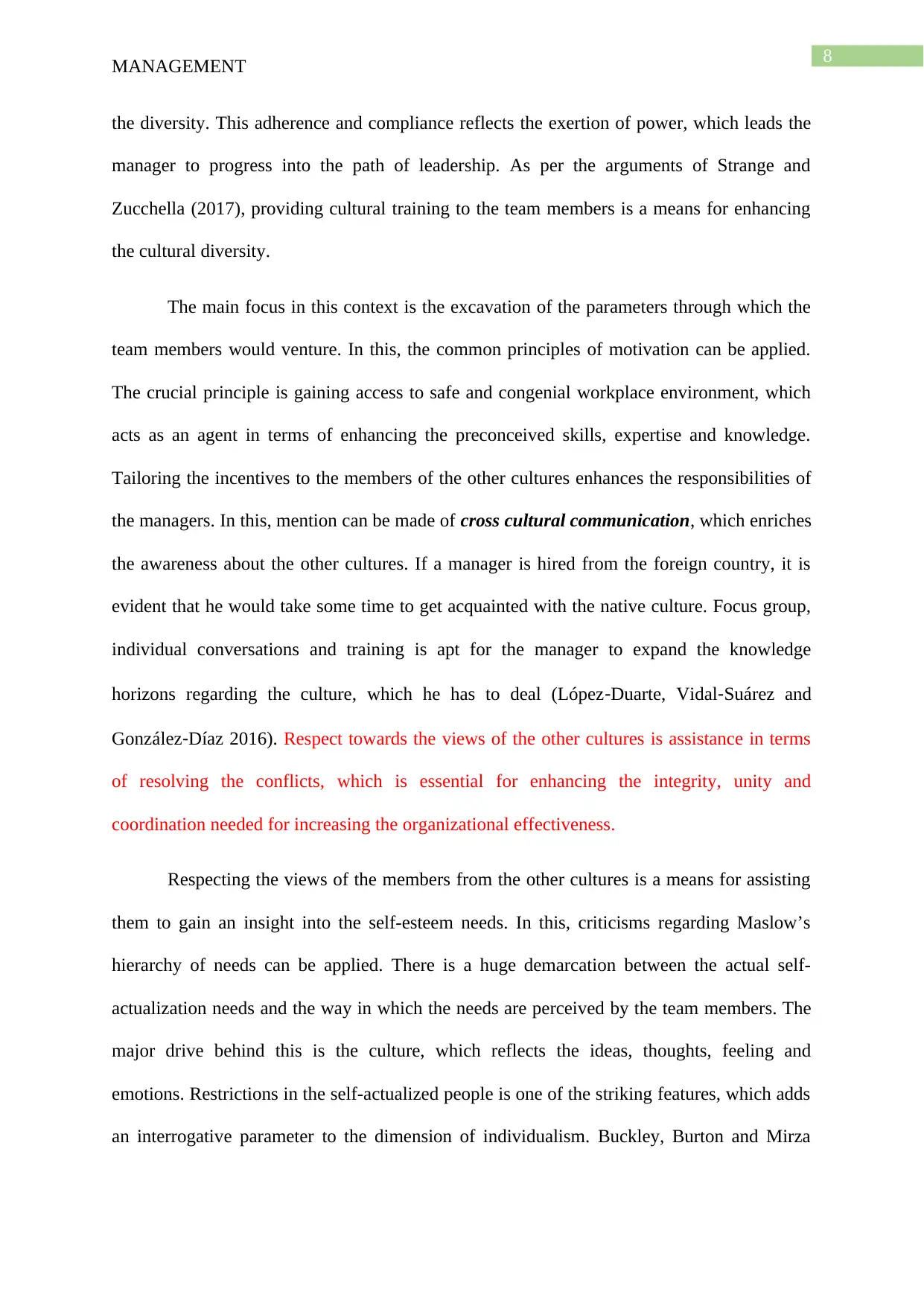
8
MANAGEMENT
the diversity. This adherence and compliance reflects the exertion of power, which leads the
manager to progress into the path of leadership. As per the arguments of Strange and
Zucchella (2017), providing cultural training to the team members is a means for enhancing
the cultural diversity.
The main focus in this context is the excavation of the parameters through which the
team members would venture. In this, the common principles of motivation can be applied.
The crucial principle is gaining access to safe and congenial workplace environment, which
acts as an agent in terms of enhancing the preconceived skills, expertise and knowledge.
Tailoring the incentives to the members of the other cultures enhances the responsibilities of
the managers. In this, mention can be made of cross cultural communication, which enriches
the awareness about the other cultures. If a manager is hired from the foreign country, it is
evident that he would take some time to get acquainted with the native culture. Focus group,
individual conversations and training is apt for the manager to expand the knowledge
horizons regarding the culture, which he has to deal (López‐Duarte, Vidal‐Suárez and
González‐Díaz 2016). Respect towards the views of the other cultures is assistance in terms
of resolving the conflicts, which is essential for enhancing the integrity, unity and
coordination needed for increasing the organizational effectiveness.
Respecting the views of the members from the other cultures is a means for assisting
them to gain an insight into the self-esteem needs. In this, criticisms regarding Maslow’s
hierarchy of needs can be applied. There is a huge demarcation between the actual self-
actualization needs and the way in which the needs are perceived by the team members. The
major drive behind this is the culture, which reflects the ideas, thoughts, feeling and
emotions. Restrictions in the self-actualized people is one of the striking features, which adds
an interrogative parameter to the dimension of individualism. Buckley, Burton and Mirza
MANAGEMENT
the diversity. This adherence and compliance reflects the exertion of power, which leads the
manager to progress into the path of leadership. As per the arguments of Strange and
Zucchella (2017), providing cultural training to the team members is a means for enhancing
the cultural diversity.
The main focus in this context is the excavation of the parameters through which the
team members would venture. In this, the common principles of motivation can be applied.
The crucial principle is gaining access to safe and congenial workplace environment, which
acts as an agent in terms of enhancing the preconceived skills, expertise and knowledge.
Tailoring the incentives to the members of the other cultures enhances the responsibilities of
the managers. In this, mention can be made of cross cultural communication, which enriches
the awareness about the other cultures. If a manager is hired from the foreign country, it is
evident that he would take some time to get acquainted with the native culture. Focus group,
individual conversations and training is apt for the manager to expand the knowledge
horizons regarding the culture, which he has to deal (López‐Duarte, Vidal‐Suárez and
González‐Díaz 2016). Respect towards the views of the other cultures is assistance in terms
of resolving the conflicts, which is essential for enhancing the integrity, unity and
coordination needed for increasing the organizational effectiveness.
Respecting the views of the members from the other cultures is a means for assisting
them to gain an insight into the self-esteem needs. In this, criticisms regarding Maslow’s
hierarchy of needs can be applied. There is a huge demarcation between the actual self-
actualization needs and the way in which the needs are perceived by the team members. The
major drive behind this is the culture, which reflects the ideas, thoughts, feeling and
emotions. Restrictions in the self-actualized people is one of the striking features, which adds
an interrogative parameter to the dimension of individualism. Buckley, Burton and Mirza
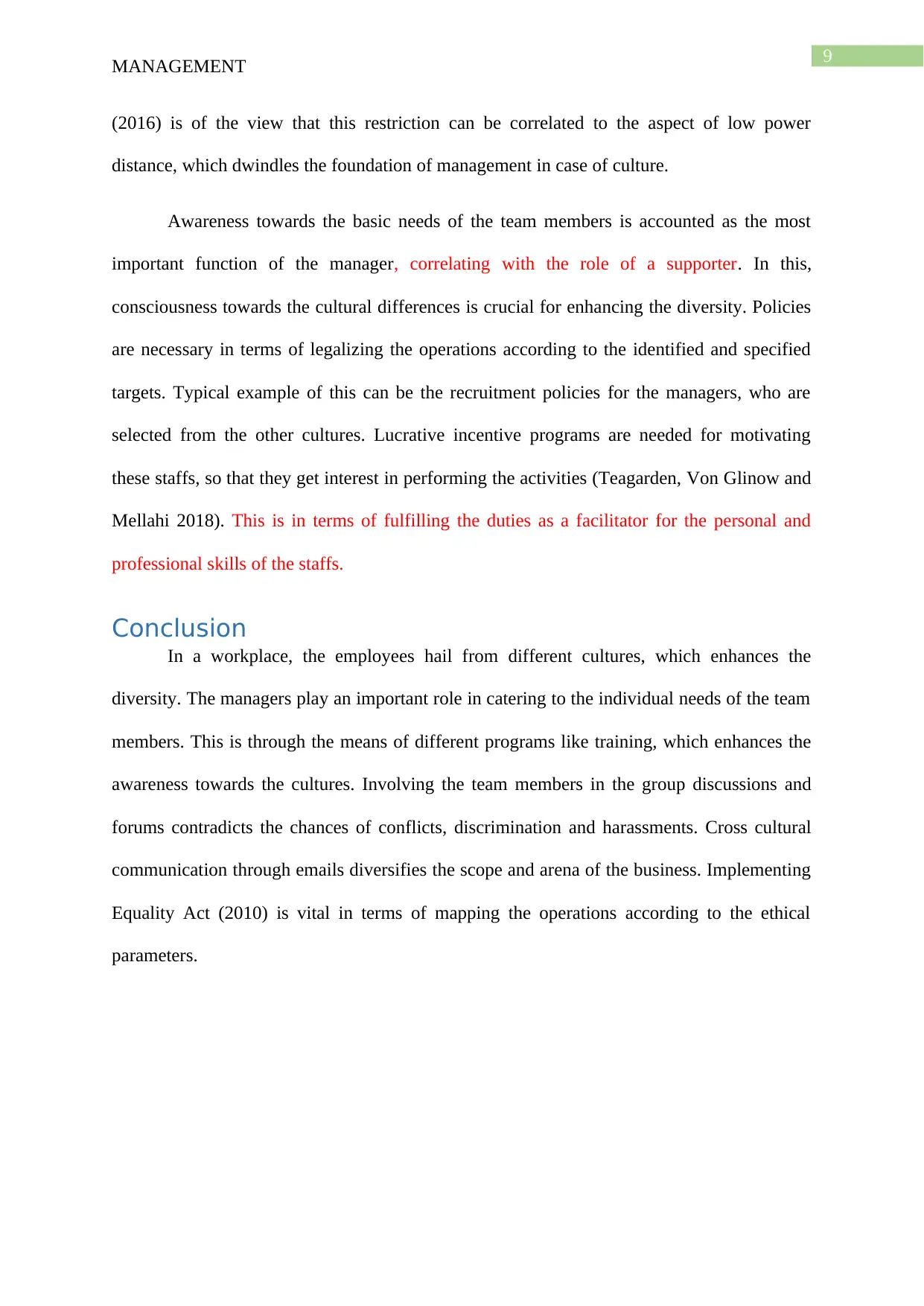
9
MANAGEMENT
(2016) is of the view that this restriction can be correlated to the aspect of low power
distance, which dwindles the foundation of management in case of culture.
Awareness towards the basic needs of the team members is accounted as the most
important function of the manager, correlating with the role of a supporter. In this,
consciousness towards the cultural differences is crucial for enhancing the diversity. Policies
are necessary in terms of legalizing the operations according to the identified and specified
targets. Typical example of this can be the recruitment policies for the managers, who are
selected from the other cultures. Lucrative incentive programs are needed for motivating
these staffs, so that they get interest in performing the activities (Teagarden, Von Glinow and
Mellahi 2018). This is in terms of fulfilling the duties as a facilitator for the personal and
professional skills of the staffs.
Conclusion
In a workplace, the employees hail from different cultures, which enhances the
diversity. The managers play an important role in catering to the individual needs of the team
members. This is through the means of different programs like training, which enhances the
awareness towards the cultures. Involving the team members in the group discussions and
forums contradicts the chances of conflicts, discrimination and harassments. Cross cultural
communication through emails diversifies the scope and arena of the business. Implementing
Equality Act (2010) is vital in terms of mapping the operations according to the ethical
parameters.
MANAGEMENT
(2016) is of the view that this restriction can be correlated to the aspect of low power
distance, which dwindles the foundation of management in case of culture.
Awareness towards the basic needs of the team members is accounted as the most
important function of the manager, correlating with the role of a supporter. In this,
consciousness towards the cultural differences is crucial for enhancing the diversity. Policies
are necessary in terms of legalizing the operations according to the identified and specified
targets. Typical example of this can be the recruitment policies for the managers, who are
selected from the other cultures. Lucrative incentive programs are needed for motivating
these staffs, so that they get interest in performing the activities (Teagarden, Von Glinow and
Mellahi 2018). This is in terms of fulfilling the duties as a facilitator for the personal and
professional skills of the staffs.
Conclusion
In a workplace, the employees hail from different cultures, which enhances the
diversity. The managers play an important role in catering to the individual needs of the team
members. This is through the means of different programs like training, which enhances the
awareness towards the cultures. Involving the team members in the group discussions and
forums contradicts the chances of conflicts, discrimination and harassments. Cross cultural
communication through emails diversifies the scope and arena of the business. Implementing
Equality Act (2010) is vital in terms of mapping the operations according to the ethical
parameters.
⊘ This is a preview!⊘
Do you want full access?
Subscribe today to unlock all pages.

Trusted by 1+ million students worldwide
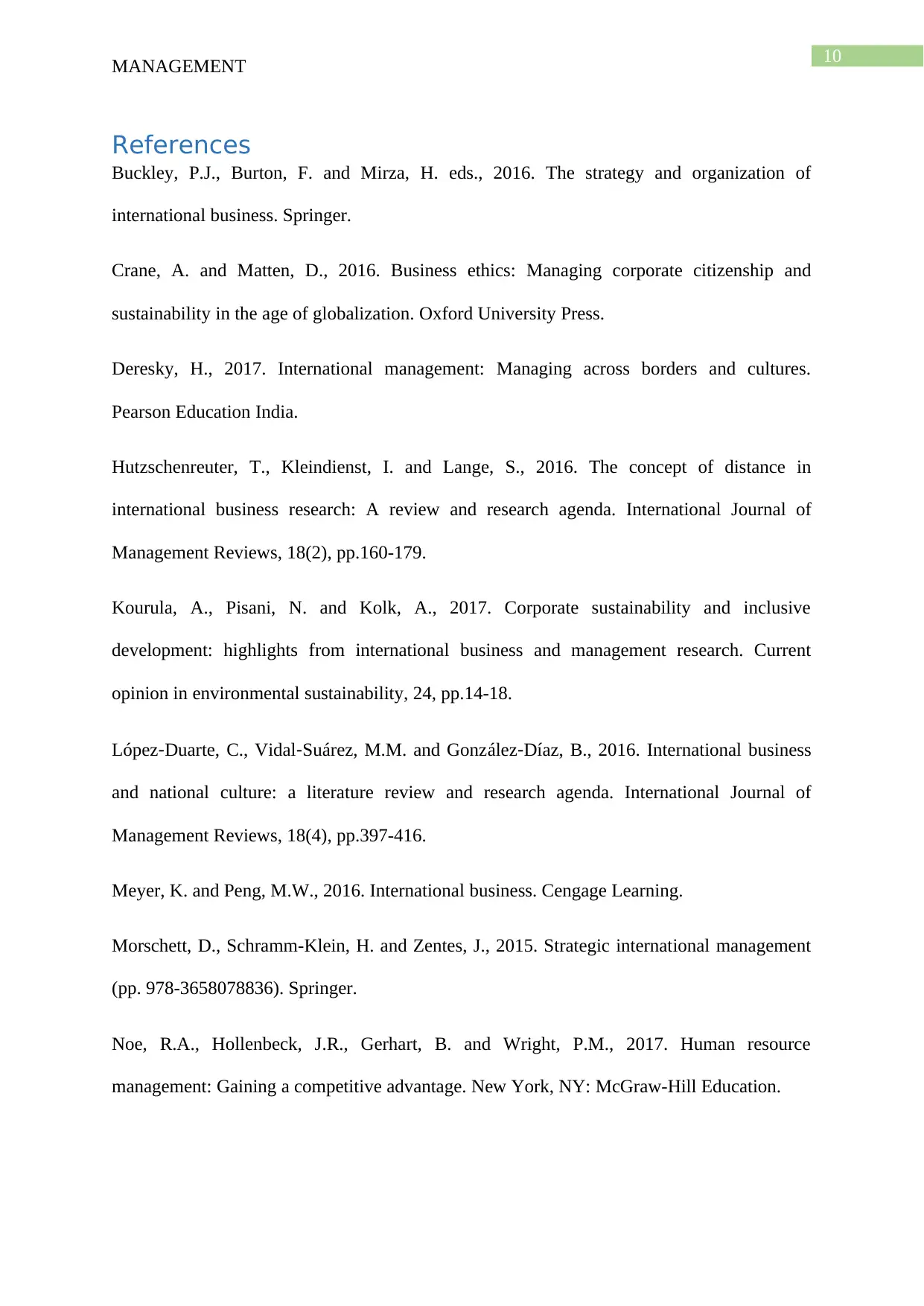
10
MANAGEMENT
References
Buckley, P.J., Burton, F. and Mirza, H. eds., 2016. The strategy and organization of
international business. Springer.
Crane, A. and Matten, D., 2016. Business ethics: Managing corporate citizenship and
sustainability in the age of globalization. Oxford University Press.
Deresky, H., 2017. International management: Managing across borders and cultures.
Pearson Education India.
Hutzschenreuter, T., Kleindienst, I. and Lange, S., 2016. The concept of distance in
international business research: A review and research agenda. International Journal of
Management Reviews, 18(2), pp.160-179.
Kourula, A., Pisani, N. and Kolk, A., 2017. Corporate sustainability and inclusive
development: highlights from international business and management research. Current
opinion in environmental sustainability, 24, pp.14-18.
López‐Duarte, C., Vidal‐Suárez, M.M. and González‐Díaz, B., 2016. International business
and national culture: a literature review and research agenda. International Journal of
Management Reviews, 18(4), pp.397-416.
Meyer, K. and Peng, M.W., 2016. International business. Cengage Learning.
Morschett, D., Schramm-Klein, H. and Zentes, J., 2015. Strategic international management
(pp. 978-3658078836). Springer.
Noe, R.A., Hollenbeck, J.R., Gerhart, B. and Wright, P.M., 2017. Human resource
management: Gaining a competitive advantage. New York, NY: McGraw-Hill Education.
MANAGEMENT
References
Buckley, P.J., Burton, F. and Mirza, H. eds., 2016. The strategy and organization of
international business. Springer.
Crane, A. and Matten, D., 2016. Business ethics: Managing corporate citizenship and
sustainability in the age of globalization. Oxford University Press.
Deresky, H., 2017. International management: Managing across borders and cultures.
Pearson Education India.
Hutzschenreuter, T., Kleindienst, I. and Lange, S., 2016. The concept of distance in
international business research: A review and research agenda. International Journal of
Management Reviews, 18(2), pp.160-179.
Kourula, A., Pisani, N. and Kolk, A., 2017. Corporate sustainability and inclusive
development: highlights from international business and management research. Current
opinion in environmental sustainability, 24, pp.14-18.
López‐Duarte, C., Vidal‐Suárez, M.M. and González‐Díaz, B., 2016. International business
and national culture: a literature review and research agenda. International Journal of
Management Reviews, 18(4), pp.397-416.
Meyer, K. and Peng, M.W., 2016. International business. Cengage Learning.
Morschett, D., Schramm-Klein, H. and Zentes, J., 2015. Strategic international management
(pp. 978-3658078836). Springer.
Noe, R.A., Hollenbeck, J.R., Gerhart, B. and Wright, P.M., 2017. Human resource
management: Gaining a competitive advantage. New York, NY: McGraw-Hill Education.
Paraphrase This Document
Need a fresh take? Get an instant paraphrase of this document with our AI Paraphraser
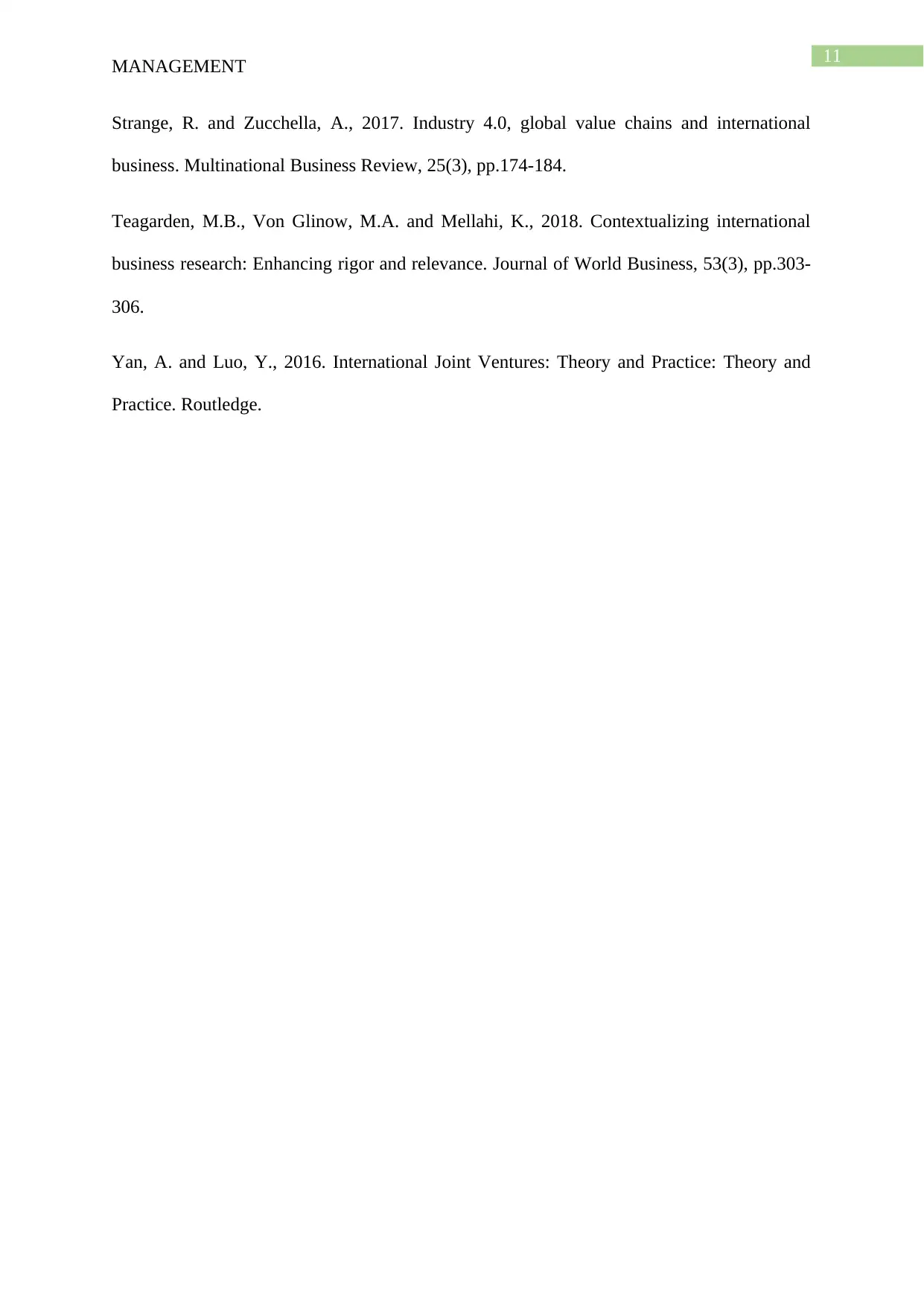
11
MANAGEMENT
Strange, R. and Zucchella, A., 2017. Industry 4.0, global value chains and international
business. Multinational Business Review, 25(3), pp.174-184.
Teagarden, M.B., Von Glinow, M.A. and Mellahi, K., 2018. Contextualizing international
business research: Enhancing rigor and relevance. Journal of World Business, 53(3), pp.303-
306.
Yan, A. and Luo, Y., 2016. International Joint Ventures: Theory and Practice: Theory and
Practice. Routledge.
MANAGEMENT
Strange, R. and Zucchella, A., 2017. Industry 4.0, global value chains and international
business. Multinational Business Review, 25(3), pp.174-184.
Teagarden, M.B., Von Glinow, M.A. and Mellahi, K., 2018. Contextualizing international
business research: Enhancing rigor and relevance. Journal of World Business, 53(3), pp.303-
306.
Yan, A. and Luo, Y., 2016. International Joint Ventures: Theory and Practice: Theory and
Practice. Routledge.
1 out of 11
Related Documents
Your All-in-One AI-Powered Toolkit for Academic Success.
+13062052269
info@desklib.com
Available 24*7 on WhatsApp / Email
![[object Object]](/_next/static/media/star-bottom.7253800d.svg)
Unlock your academic potential
Copyright © 2020–2026 A2Z Services. All Rights Reserved. Developed and managed by ZUCOL.





